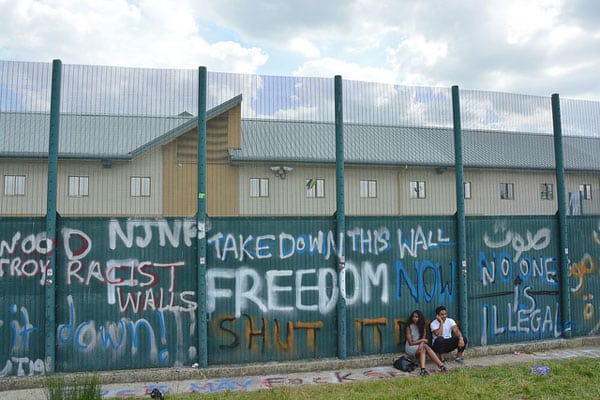
September 6, 2018; NPR
Amidst the chaos that reigns both in Washington and at the US-Mexico border, the Trump administration wants to clarify some rules. Specifically, the administration wants to be able to detain children with their families for indefinite periods. A joint filing by the Department of Homeland Security (DHS) and the Department of Health and Human Services (HHS) says this is a necessary step to fully implement federal immigration law.
Detention of children who immigrate to the US is currently regulated primarily by the conditions set forth in Flores v. Sessions, more commonly known as the Flores case. As NPQ has pointed out before, President Trump has been looking to circumvent the restrictions set by Flores’ precedent since the fiasco of large-scale family separation began in June. Flores rules that children cannot be detained longer than five days except in cases of emergency, and they must be held in facilities licensed by the state to care for minors.
The New York Times’ Caitlin Dickerson reports that the number of migrant children in detention reached a record high this month of 12,800. Dickerson says this isn’t due to a higher number of children crossing the border, but that “red tape and fear brought on by stricter immigration enforcement have discouraged relatives and family friends from coming forward to sponsor children,” so they stay in the camps for longer.
The first request of the administration’s new proposed rules would “eliminate that barrier to the continued use of FRCs [Family Residential Centers], by creating an alternative federal licensing scheme for such facilities.” By creating a federal program that would license shelters to detain families together, the proposed policy circumvents the rules about unaccompanied minors. Plus, say DHS and HHS, the administration will be able to implement the law in a more exact and cost-effective manner. Specifically, says the filing, “This rule would allow for detention at FRCs for the pendency of immigration…in order to permit families to be detained together.” In other words, DHS would keep families in detention until their immigration hearings, which can take many months to reach. Some families are refusing reunification, according to the ACLU, because the parents have already been deported and they fear that having their children join them in their country of origin would be perilous.
Many devastating aspects of this crisis have been covered, from the neglect and abuse present in some shelters to the detrimental health effects of detention on children. PBS reports that over 400 children remain in custody without their parents, despite an order from a judge that demanded they all be reunited with their families by July 26th. Moreover, the continued flood of apprehensions has not stopped: RAICES reports, “Border Patrol agents apprehended nearly 13,000 members of “family units” last month, the latest data shows, the highest August total ever recorded.”
The fixation with immigrant families seems to consume federal attention. Yesterday, Senator Jeff Merkley (D-OR) revealed that the administration diverted nearly $10 million from the Federal Emergency Management Agency (FEMA) to Immigration and Customs Enforcement (ICE), the agency most identified and involved with the separation of children from their parents. According to the Washington Post’s Isaac Stanley-Becker, “DHS requested that about $9.8 million going toward FEMA efforts such as ‘Preparedness and Protection’ and ‘Response and Recovery’ be funneled instead into ICE coffers, specifically underwriting “Detention Beds’ and the agency’s “Transportation and Removal Program.”
Sign up for our free newsletters
Subscribe to NPQ's newsletters to have our top stories delivered directly to your inbox.
By signing up, you agree to our privacy policy and terms of use, and to receive messages from NPQ and our partners.
It’s telling that this particular policy—the detention of children—is one on which the administration persists in spending its political capital, especially after the president hastily rescinded the initial ruling in the face of public backlash. The persistence of this practice indicates a by-any-means mindset that uses the greatest source of fear—the well-being of one’s family—to assert dominance and exclusionary power over people from the global south.
Leecia Welch, a senior attorney at the National Center for Youth Law, told The Hill, “The Trump administration’s proposed regulations, purporting to implement the Flores settlement, are nothing more than a prescription for the mass internment of children.”
Judge Dolly Gee, who oversees the Flores settlement, said, “It is apparent that Defendants’ Application is a cynical attempt to shift responsibility to the Judiciary for over 20 years of congressional inaction and ill-considered Executive action that have led to the current stalemate.”
Immigration Equality, a leading LGBTQ-immigrant rights organization, tweeted, “The Trump administration intends to detain entire families indefinitely and lower the standards of care under which they are detained. We need everyone to speak up in opposition to this inhumane policy! #FamiliesBelongTogetherANDFree #EndFamilyDetention.”
The administration says that loopholes make it harder to enforce border policy. However, Peter Schey, president of the Los Angeles-based Center for Human Rights and Constitutional Law, pointed out that treating children with compassion and care is not a loophole; “It is the way civilized nations treat vulnerable children with due regard to their tender age and lack of culpability for the circumstances in which they find themselves.”
Schey and others spoke against the proposed changes, and some even promised to fight. Michelle Brane of the Women’s Refugee Commissions said, “These regulations undermine basic standards of care in any facility that is holding…they really are incredibly extensive in terms of how far they go to undermine child protection.”
No one in the administration appears to be looking out for the welfare of the children, but that is where civil rights groups have focused some of their advocacy, and we expect to see more on this attempt.—Erin Rubin













